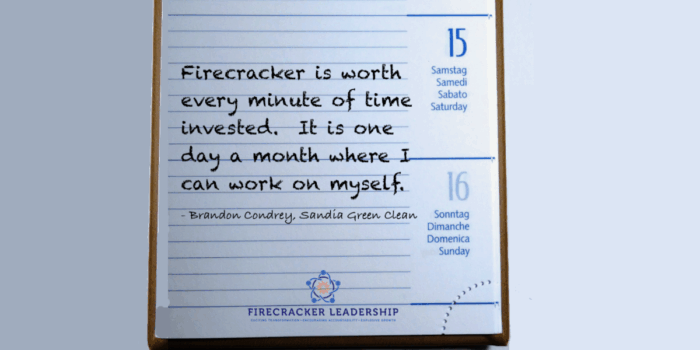Speak your gratitude I recently attended a funeral for a man who had touched so many lives. Story after story…
I hope some of these are no-brainers. I’d bet everyone could work on at least one of these.
If you want to live a longer, happier life, you’re not alone. Life extension is all the rage, especially in Silicon Valley. Ice baths. Supplements. Red light therapy. Ultrasound treatments.
Then there are the anti-aging startups; notable names like Amazon’s Jeff Bezos, Google co-founder Larry Page, and PayPal co-founder Peter Thiel have invested significant sums.
Taking your cues from leaders in the startup world makes sense (who doesn’t appreciate the distinction between one- and two-way door decisions), but maybe not in this case. For example, while immersing yourself in cold water will certainly perk you up, there’s currently no scientific evidence indicating correlation — much less causation — between ice baths and longevity.
But there is plenty of evidence that embracing the following habits can help you live a longer, healthier life. For one thing, being able to pass any of these quick tests — the pushup test, walking test, sitting-rising test, and grip strength test — correlates with a lower risk of early death.
And then there’s a study recently presented at the Nutrition 2023 conference that tracked the lifestyles of over 700,000 people, adding eight healthy habits at age 40 could add over 20 years to your lifespan.
Adopt those same habits at age 60 and you could still add as many as 18 years to your life.
As lead study author Xuan-Mai Nguyen says, “There’s a 20-year period in which you can make these changes, whether you do it gradually or all at once. [Even] if you start off with chronic diseases, making changes does still help.”
Want to live a longer, healthier life? Regardless of your age — or where you’re starting from in terms of overall health — start making changes that ensure you can pass the following eight tests, ranked in order of contribution to longevity.
1. You exercise.
Compared with those who do not exercise, people who do — whether light, moderate, or vigorous — had a 46 percent decrease in the risk of death from any cause.
According to the researchers, the goal is 7.5 metabolic equivalent exercise hours, a fancy way of saying, for example, that walking up a flight of stairs counts as four minutes, even though it might only take you 15 seconds.
If that’s too complicated for you (it is for me), other research determined the most favorable running regimen for reducing cardiovascular mortality was six miles per week, broken down into three running days per week.
What type of exercise you do matters less than regularly exercising. The key is to find something you like to do, and stick with it.
2. You aren’t addicted to opioids.
If only because it reduces your risk of early death by 38 percent. Makes sense.
But this also raises an interesting point: exercise actually ranks ahead of opioid addiction on the longevity factor scale.
Yep: exercise matters.
3. You don’t use tobacco.
Keep in mind the researchers studied only people who had never used tobacco; in their case, the risk of dying early dropped by 29 percent.
But according to the CDC, quitting smoking reduces your risk of death and can add up to 10 years to your life expectancy.
4. You manage stress.
Reducing the level of stress you feel reduces the risk of early death by 22 percent.
Granted, finding ways to feel less stressed is hard. So is defining “less stressed.” According to Michael Roizen in the book The Great Age Reboot: Cracking the Longevity Code for a Younger Tomorrow, the goal is to “sleep well and feel at ease in your own skin.”
Getting enough sleep is a great start, since at least one study found that lack of sleep correlates with tension, anxiety, and lower overall mood. Sleep: good for you now, good for you later.
As for stress? Here are three science-backed ways to better deal with stress.
5. You eat a plant-based diet.
While you don’t have to become a vegetarian or vegan, you do probably need to eat more vegetables. (I definitely do.) The study found that people who adopt something along the lines of a Mediterranean diet — one long on lean meats, vegetables, and whole grains — reduced their risk of dying early by 21 percent.
When in doubt, add a serving of vegetables or fruit to your meal. (Spinach is my go-to; no matter what else we’re having, I try to toss a handful of leaves on the plate.)
6. You avoid binge drinking.
While your perceived mileage may vary, researchers define “binge drinking” as having more than four alcoholic beverages in a day.
Avoid that, and your risk of dying early goes down by 19 percent.
7. You get a good night’s sleep.
Yes, we’re back to sleep: According to the study, people who sleep between seven and nine hours a night with no long periods of wakefulness reduce their rate of death from any cause by 18 percent.
If that’s not reason enough, studies show getting only six hours of sleep makes any task that requires focus, deep thinking, or problem-solving a lot harder; in fact, where attention and reaction time are concerned, sleeping only six hours is like drinking a couple of beers — and sleeping only four hours is like drinking five beers.
Other studies show that sleep deprivation makes completing any activity that requires multiple steps — in short, any meaningful activity — much more difficult.
Which makes sleep not just a lifespan booster, but also a competitive advantage.
8. You have positive social relationships.
The study found that having a few really good friends reduces your risk of dying by 5 percent.
But that might be understating the impact. The 2005 Australian Longitudinal Study of Aging found that close relationships with children and other relatives had very little impact on how long you live, but people with the most friends tended to outlive those with the fewest by 22 percent.
Better yet, a clinical review of nearly 150 studies found that people with strong social ties had a 50 percent better chance of survival, regardless of age, sex, health status, and cause of death, than those with weaker ties. According to the researchers, the health risk of having few friends was similar to smoking 15 cigarettes a day, and more dangerous than being obese or not exercising in terms of decreasing your lifespan.
Does that mean you need to have tons of friends? Nope: you “just” need two or three really, really good friends — and then, of course, plenty of people who aren’t necessarily friends but are fun to be around, or result in a mutually beneficial relationship, or share common interests.
In short, the key is to nurture the most important relationships in your life, because then you’re more likely to live a longer and a happier life.
BY JEFF HADEN, CONTRIBUTING EDITOR, INC.



